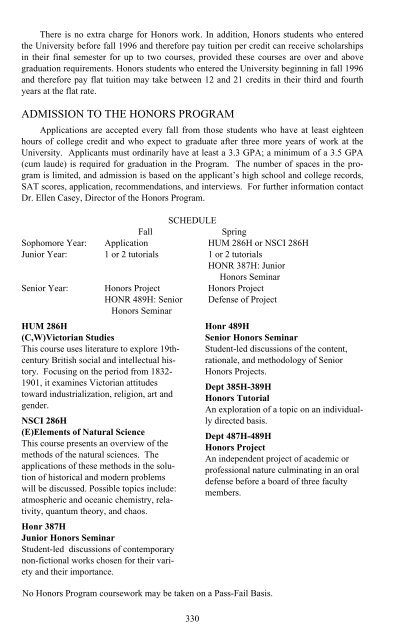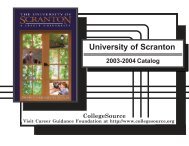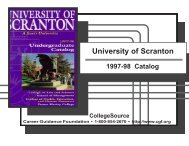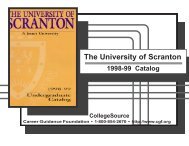- Page 1 and 2:
University of Scranton 1999-2000 Un
- Page 3 and 4:
THE UNIVERSITY OF SCRANTON ACADEMIC
- Page 5 and 6:
ACCREDITATION The University of Scr
- Page 7 and 8:
Political Science..................
- Page 9 and 10:
THE SEAL OF THE UNIVERSITY OF SCRAN
- Page 11 and 12:
THE CAMPUS The University’s 50-ac
- Page 13 and 14:
As an urban American university, Th
- Page 15 and 16:
and a 28-member Board of Governors,
- Page 17 and 18:
FULBRIGHT AND OTHER INTERNATIONAL F
- Page 19 and 20:
1989 Kim Marie Newak...............
- Page 21 and 22:
PHI ALPHA THETA* International Hono
- Page 23 and 24:
OMEGA BETA SIGMA The Business Honor
- Page 25 and 26:
ADMISSION The Admissions Committee
- Page 27 and 28:
ACADEMIC DEVELOPMENT PROGRAM Applic
- Page 29 and 30:
The University provides in-room acc
- Page 31 and 32:
TUITION AND FEES ACADEMIC YEAR 1999
- Page 33 and 34:
INTERSESSION/SUMMER SESSIONS CREDIT
- Page 35 and 36:
UNIVERSITY OF SCRANTON AWARDS The U
- Page 37 and 38:
THE JOSEPH D. AUSTIN SCHOLARSHIP—
- Page 39 and 40:
THE JOSEPH JAMES AND MARY AGNES AND
- Page 41 and 42:
THE EDUCATIONAL FREEDOM SCHOLARSHIP
- Page 43 and 44:
THE REV. DEXTER HANLEY, S.J., SCHOL
- Page 45 and 46:
THE WILLIAM V. LOUGHRAN AND ALBERT
- Page 47 and 48:
THE MARIAN M. AND PATRICK F. O’HA
- Page 49 and 50:
THE CHARLES J. VOLPE SCHOLARSHIP AN
- Page 51 and 52:
ENDOWED CHAIRS THE ALPERIN CHAIR IN
- Page 53 and 54:
DEGREE PROGRAMS The University offe
- Page 55 and 56:
The Foreign Study experience typica
- Page 57 and 58:
THE SOM ACADEMIC ADVISING CENTER Th
- Page 59 and 60:
degree requirements for summer, fal
- Page 61 and 62:
The total number of grade-point ave
- Page 63 and 64:
egionally accredited institutions.
- Page 65 and 66:
A student wishing to prevent the pu
- Page 67 and 68:
models within a particular scientif
- Page 69 and 70:
C/IL 104/104L Computing and Informa
- Page 71 and 72:
CHEM 112 General Chemistry I CHEM 1
- Page 73 and 74:
Art History/Music History/Theater
- Page 75 and 76:
Social Behavioral Science — 2 cou
- Page 77 and 78:
General Area: Social Science 1 FIRS
- Page 79 and 80:
ART AND MUSIC DR. MICHAEL DeMICHELE
- Page 81 and 82:
ARTH 117 Dr. Dunn (W)Early Christia
- Page 83 and 84:
ARTH 384, 484 Dr. Dunn Special Topi
- Page 85 and 86:
BIOLOGY DR. MICHAEL A.HARDISKY, Cha
- Page 87 and 88:
BIOL 105 Dr. Conway (E)Biodiversity
- Page 89 and 90:
BIOL 346 Dr. J. Carey Endocrinology
- Page 91 and 92:
BIOL 384 Staff Special Topics in Bi
- Page 93 and 94:
BIOCHEMISTRY The Bachelor of Scienc
- Page 95 and 96:
CHEMISTRY-COMPUTERS The program Che
- Page 97 and 98:
In cases where a student withdraws
- Page 99 and 100:
CHEM 352 Staff Chemical Toxicology
- Page 101 and 102:
COMMUNICATION DR. ROBERT P. SADOWSK
- Page 103 and 104:
COMMUNICATION Dept. and No. Descrip
- Page 105 and 106:
COMM 228 Staff (D)Intercultural 3 c
- Page 107 and 108:
COMM 332 Staff Documentary Film 3 c
- Page 109 and 110:
COMPUTING SCIENCES PROF. RICHARD M.
- Page 111 and 112:
CMPS 108 Staff COBOL Programming 3
- Page 113 and 114:
CMPS 370 Staff Computer Graphics 3
- Page 115 and 116:
MINOR. A minor in Criminal Justice
- Page 117 and 118:
S/CJ 316 Atty. Cimini Principles of
- Page 119 and 120:
ENGINEERING DR. ROBERT A. SPALLETTA
- Page 121 and 122:
ELECTRONICS-BUSINESS The state of t
- Page 123 and 124:
PRE-ENGINEERING The University prov
- Page 125 and 126:
EE 241 Staff Circuit Analysis 4 cre
- Page 127 and 128:
ENGLISH DR. JONES DeRITTER, Chairpe
- Page 129 and 130:
ENGL 103 Staff (C)Introduction to P
- Page 131 and 132:
ENGL 221 Dr. Jordan, Prof. Hill (C)
- Page 133 and 134:
ENGL 321 Dr. Fraustino Macabre Mast
- Page 135 and 136:
ENGL 372 Dr. Fraustino (C)The Engli
- Page 137 and 138:
THEATRE DR. JOAN ROBBINS, Program D
- Page 139 and 140:
THTR 212 Dr. Robbins (C)Theatre His
- Page 141 and 142:
WRITING All Writing courses have WR
- Page 143 and 144:
ENVIRONMENTAL SCIENCE DR. MICHAEL C
- Page 145 and 146:
FOREIGN LANGUAGES AND LITERATURES D
- Page 147 and 148:
INTERNATIONAL LANGUAGE-BUSINESS The
- Page 149 and 150:
FREN 321-322 Staff * Advanced Frenc
- Page 151 and 152:
GERM 425 Dr. Kamla German Literatur
- Page 153 and 154:
SPANISH SPAN 101-102 Staff *(C) Ele
- Page 155 and 156:
SPAN 431 Staff Spanish-American 3 c
- Page 157 and 158:
LITERATURE LIT 105 Staff (C,D)Intro
- Page 159 and 160:
INTERNATIONAL STUDIES A major in In
- Page 161 and 162:
HIST 217 Dr. Hueston (C)History of
- Page 163 and 164:
HIST 295 Dr. DeMichele Britain: Pas
- Page 165 and 166:
HIST 335 Staff World War II, Cold W
- Page 167 and 168:
BIOMATHEMATICS The biomathematics m
- Page 169 and 170:
MATH 204 Staff (Q)Special Topics of
- Page 171 and 172:
MILITARY SCIENCE LTC. RUSSELL POLIN
- Page 173 and 174:
MS 101-102 Staff Concepts of 2 cred
- Page 175 and 176:
NEUROSCIENCE DR. TIMOTHY CANNON, Di
- Page 177 and 178:
PHILOSOPHY DR. WILLIAM V. ROWE, Cha
- Page 179 and 180:
PHIL 218 Dr. Meagher (D)Feminism: 3
- Page 181 and 182:
PHIL 311 Drs. Baillie, McGinley (P)
- Page 183 and 184:
PHIL 420 Dr. Black (P)Philosophy of
- Page 185 and 186:
BIOPHYSICS The Biophysics major is
- Page 187 and 188:
PHYS 110 Dr. Connolly Meteorology 3
- Page 189 and 190:
POLITICAL SCIENCE DR. LEONARD W. CH
- Page 191 and 192:
PS 130-131 Staff (S)American Nation
- Page 193 and 194:
PS 311-312 Dr. Kocis Constitutional
- Page 195 and 196:
PS 338 Dr. Parente Politics of Isla
- Page 197 and 198:
PSYCHOLOGY Dept & No Descriptive Ti
- Page 199 and 200:
PSYC 236 Dr. Baril Industrial/Organ
- Page 201 and 202:
SOCIOLOGY PROF. JOHN PRYLE, Chairpe
- Page 203 and 204:
Gerontology (continued) 1 Departmen
- Page 205 and 206:
SOC 232 Atty. Cimini (D)Great Ameri
- Page 207 and 208:
GERO 232 Prof. Naughton Aging and D
- Page 209 and 210:
THEOLOGY/RELIGIOUS STUDIES Dept. an
- Page 211 and 212:
T/RS 227 Dr. Kopas, O.S.F. (P)Chris
- Page 213 and 214:
T/RS 312 Fr. Sable, S.J. Jesuit Spi
- Page 215 and 216:
T/RS 334 Dr. Shapiro Jewish and Chr
- Page 217 and 218:
INTD 224 Dr. Dutko (Q, W)Science, 3
- Page 219 and 220:
MISSION STATEMENT The Mission of Th
- Page 221 and 222:
ACCOUNTING Accounting is defined as
- Page 223 and 224:
ACCOUNTING-MANAGERIAL ACCOUNTING TR
- Page 225 and 226:
ACC 470 Dr. Linton, Staff Law for A
- Page 227 and 228:
ECO 101 Staff (S)Current Economic I
- Page 229 and 230:
ECO 460 Drs. Corcione, Nguyen Monet
- Page 231 and 232:
FIN 351 Staff Introduction to Finan
- Page 233 and 234:
ECO/IB 351 Dr. Trussler/Staff (D)En
- Page 235 and 236:
MANAGEMENT DR. GERALD BIBERMAN, Cha
- Page 237 and 238:
MGT 361 Dr. Biberman, Staff Human R
- Page 239 and 240:
MARKETING DR. GERALD BIBERMAN, Chai
- Page 241 and 242:
OPERATIONS AND INFORMATION MANAGEME
- Page 243 and 244:
OIM 365 Dr. Cunningham, Staff Logis
- Page 245 and 246:
COUNSELING AND HUMAN SERVICES DR. O
- Page 247 and 248:
HS 242 Staff Counseling Theories 3
- Page 249 and 250:
HS 423 Staff Legal and Health Aspec
- Page 251 and 252:
EARLY CHILDHOOD EDUCATION Dept. and
- Page 253 and 254:
SECONDARY EDUCATION (BIOLOGY) Dept.
- Page 255 and 256:
SECONDARY EDUCATION (COMMUNICATION)
- Page 257 and 258:
SECONDARY EDUCATION (GENERAL SCIENC
- Page 259 and 260:
SECONDARY EDUCATION (MATH) Dept. an
- Page 261 and 262:
SECONDARY EDUCATION (PHYSICS) Dept.
- Page 263 and 264:
SPECIAL EDUCATION Dept. and No. Des
- Page 265 and 266:
EDUC 241 Dr. Cantrell Foundations o
- Page 267 and 268:
EDUC 346 Dr. Cozza (D)Social-Studie
- Page 269 and 270:
EDUC 462 Staff Instruction in SPED
- Page 271 and 272:
PHED 202 Dr. Wodder Sports Administ
- Page 273 and 274:
EXSC 210 Dr. Deitrick Sports Physio
- Page 275 and 276:
HEALTH ADMINISTRATION Dept. and No.
- Page 277 and 278:
HEALTH ADMINISTRATION Concentration
- Page 279 and 280:
NURSING DR. PATRICIA HARRINGTON, Ch
- Page 281 and 282: NURSING Dept. and No. Descriptive T
- Page 283 and 284: NURS 312 Dr. Maddox, Staff (D)Nursi
- Page 285 and 286: NURS 493 Drs. Bailey, Carpenter, St
- Page 287 and 288: OCCUPATIONAL THERAPY Dept. and No.
- Page 289 and 290: OT 347 Prof. Ikiugu Pathological Co
- Page 291 and 292: PHYSICAL THERAPY DR. CAROLYN E. BAR
- Page 293 and 294: PHYSICAL THERAPY Dept. and No. Desc
- Page 295 and 296: PT 347 Dr. Mattingly Applied Neuros
- Page 297 and 298: PT 456 Profs. Hakim, Grant PT Appro
- Page 299 and 300: PT 590 Prof. Wagner Clinical-Educat
- Page 301 and 302: MISSION STATEMENT Dexter Hanley Col
- Page 303 and 304: ADMISSION OF TRANSFER STUDENTS Unde
- Page 305 and 306: SELF-IMPROVEMENT Students who do no
- Page 307 and 308: SUGGESTED GUIDE TO PROGRAM PLANNING
- Page 309 and 310: ASSOCIATE DEGREES ASSOCIATE IN ARTS
- Page 311 and 312: CRIMINAL JUSTICE General Education
- Page 313 and 314: HUMAN SERVICES General Education GE
- Page 315 and 316: CERTIFICATES FOR ACADEMIC CREDIT A
- Page 317 and 318: CERTIFICATE IN GERONTOLOGY* (24 cre
- Page 319 and 320: ACCOUNTING (24 credits) ACC 251, 25
- Page 321 and 322: TUITION AND FEES 1999-2000 Dexter H
- Page 323 and 324: Residential or commuter options are
- Page 325 and 326: Dexter Hanley College Deans’ Scho
- Page 327 and 328: The Graduate School The Graduate Sc
- Page 329 and 330: The selection of the graduate-cours
- Page 331: PHIL 120J Fr. McKinney Introduction
- Page 335 and 336: BLDR 455 Policy and Planning 3 cred
- Page 337 and 338: EASTERN CHRISTIAN STUDIES (ECS) RUS
- Page 339 and 340: ECS 110 3 credits Biography as Cult
- Page 341 and 342: ITALIAN STUDIES CONCENTRATION DR. V
- Page 343 and 344: Organizational Social Responsibilit
- Page 345 and 346: Randolph, Orlando; Carey & Associat
- Page 347 and 348: In addition to these skills and val
- Page 349 and 350: The University offers all applicant
- Page 351 and 352: Outside the Classroom Much of a stu
- Page 353 and 354: CAMPUS WOMEN’S CENTER The Campus
- Page 355 and 356: The University’s programs have pr
- Page 357 and 358: The Wellness Center also is home to
- Page 359 and 360: THEATRE The tradition of theatre an
- Page 361 and 362: University Directory Michael G. Bou
- Page 363 and 364: Panos Apostolidis, Ph.D. (1977-1989
- Page 365 and 366: Alan L. Brumagim (1990) Associate P
- Page 367 and 368: Laura Helene Ellis (1994) Assistant
- Page 369 and 370: Roxanne T. Johnson (1993) Associate
- Page 371 and 372: Mary Elizabeth Moylan (1986) Associ
- Page 373 and 374: Joyce Simcoe Simutis (1997) Instruc
- Page 375 and 376: Anthony Agati (1995) Assistant Dire
- Page 377 and 378: Marise Garofalo (1998) Outreach Spe
- Page 379 and 380: Deanne Loftus (1989) Enrollment Man
- Page 381 and 382: George J. Schemel, S.J. (1985) Dire
- Page 383 and 384:
AFFILIATED FACULTY DIOCESAN FACULTY
- Page 385 and 386:
ASSOCIATION OF JESUIT COLLEGES AND
- Page 387:
Service Learning 261, 347 SOM Acade
















